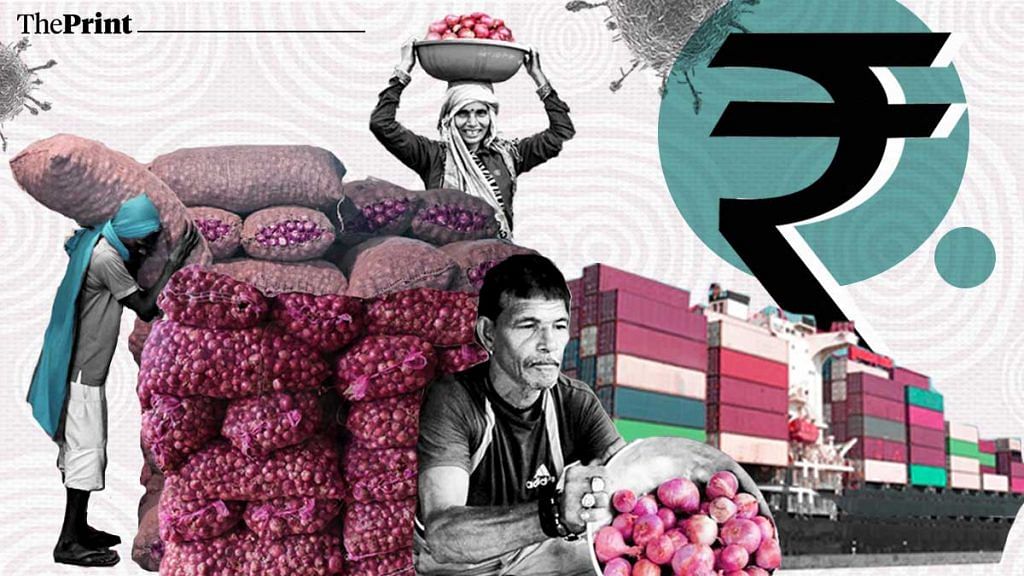The central government recently issued a notification banning the export of onions. The trigger for this move was that the wholesale price of onion has seen a steady increase over the last two months — in retail markets, the price is now around Rs 35-40 per kg, as against Rs 25-30 per kg in June.
The recent rise in prices is mainly due to heavy rains in August that have affected the almost market-ready onion crop in Karnataka, which was supposed to hit markets in early September. While Indian onions are routinely exported to countries in the Gulf, Sri Lanka and Bangladesh, the demand from Sri Lanka has picked up due to destruction of its own crops due to rains.
A supply crunch in the domestic market would cause a rise in CPI food inflation and would hurt consumers who are already reeling under the impact of the Covid-induced lockdown that sharply affected their incomes. The move is intended to provide relief to households who are sensitive to changes in price of onions. But while the ban favours consumers, it hurts farmers’ interests.
Also read: Bangladesh asks India to resume onion exports, upset over breach of ‘unwritten understanding’
Doubling farmers’ income
The government has set a target of doubling farmers’ income by 2024. How will this be achieved? While some part of the increase in income can come from higher yields, some will come from higher prices. In fact, if supply rises very fast, markets are flooded, prices crash and farmers end up throwing away farm produce. Scenes of tomatoes and onion on the streets have been seen often enough in recent years.
The recent reforms including the three ordinances governing agricultural produce marketing, contract farming and an amendment to the Essential Commodities Act are aimed at providing barrier-free trading platforms and ensuring better returns for farmers. The government recently launched the Rs 1 lakh crore agri infrastructure fund, under which start-ups, farmer groups, and agri-entrepreneurs will have access to subsidised credit to build cold storage facilities, warehouses and other infrastructure to minimise post-production losses.
While these are all steps in the right direction, the onion export ban has caused unrest among farmers as it hurts their interests. Onion prices are highly volatile. While farmers suffer during excess supply and depressed prices, they are unable to reap the benefits of higher prices amid crop shortages and a surge in demand in the international market if price caps are imposed or exports are banned. Since supply is lower, the total income of farmers falls when the crop is destroyed. Higher prices would have allowed them to make up some of the loss in income.
The GDP fell 23.9 per cent in the first quarter of 2020-21, but the silver lining was agriculture and allied activities, which grew at 3.4 per cent as compared to 3 per cent in the corresponding quarter last year. Normally, it is the manufacturing and services sector that drive GDP growth, but given the unprecedented crisis, agriculture is seen to be the bright spot. While better sowing and a good monsoon augur well for agricultural growth, remunerative prices for farmers are needed to ensure sustained growth in agricultural Gross Value Added (GVA).
RBI Governor Shaktikanta Das, in his recent address, emphasised the importance of shifting the terms of trade in favour of agriculture. Favourable terms of trade are key to generating robust agricultural GVA. Agricultural exports enable farmers to take advantage of international terms of trade and technology.
Also read: ‘Bangalore Rose’ onion growers hit hard by Modi govt ban on export, say will affect income
Political hot buttons
Onions have become political hot buttons, thanks to the high demand from urban consumers who expect a sustained supply. But seasonal factors have always affected the supply of onions.
How much an onion price rise hurts households also depends on how important onions are as part of the total household consumption expenditure. Research using data from the National Sample Survey Organisation (NSSO)’s consumer expenditure survey suggests that there has been a decline in the share of expenditure on food. Between 2004-05 and 2011-12, the proportion of consumer expenditure has declined the most for cereals, followed by vegetables and pulses. Milk, fruits, and eggs, meat and fish have seen a higher proportion.
While the proposed amendments to the Essential Commodities Act protect exporters from arbitrary export restrictions, the primary source of arbitrary and unpredictable restrictions is the Foreign Trade (Development and Regulation) Act, 1992. The preamble of the act states that its purpose is to augment exports, but it gives powers to the central government to prohibit, regulate and restrict export of goods.
Between 2014 and 2019 (five years), the government changed the rules on onion export 17 times, more than three times a year on average. Farmers who export have no stable legal regime. This is inimical to India’s image as a stable and reliable exporter of onions.
More needs to be done
Much more is needed to provide the legal framework which will facilitate international trade in agricultural commodities and enable Indian farmers to participate in international markets. Very often, price caps are imposed on exports. This time the government has banned exports altogether.
Consumers are paying more for vegetables, and farmers have not gained much. The gap between wholesale and retail inflation has been the widest for vegetables and pulses, and has widened further during the lockdown. The need of the hour is to address the supply disruption so that retail prices start moderating.
Ila Patnaik is an economist and a professor at National Institute of Public Finance and Policy.
Radhika Pandey is a consultant at NIPFP.
Views are personal.
Also read: Why India has increased economic freedoms in response to Covid, unlike Europe & US
